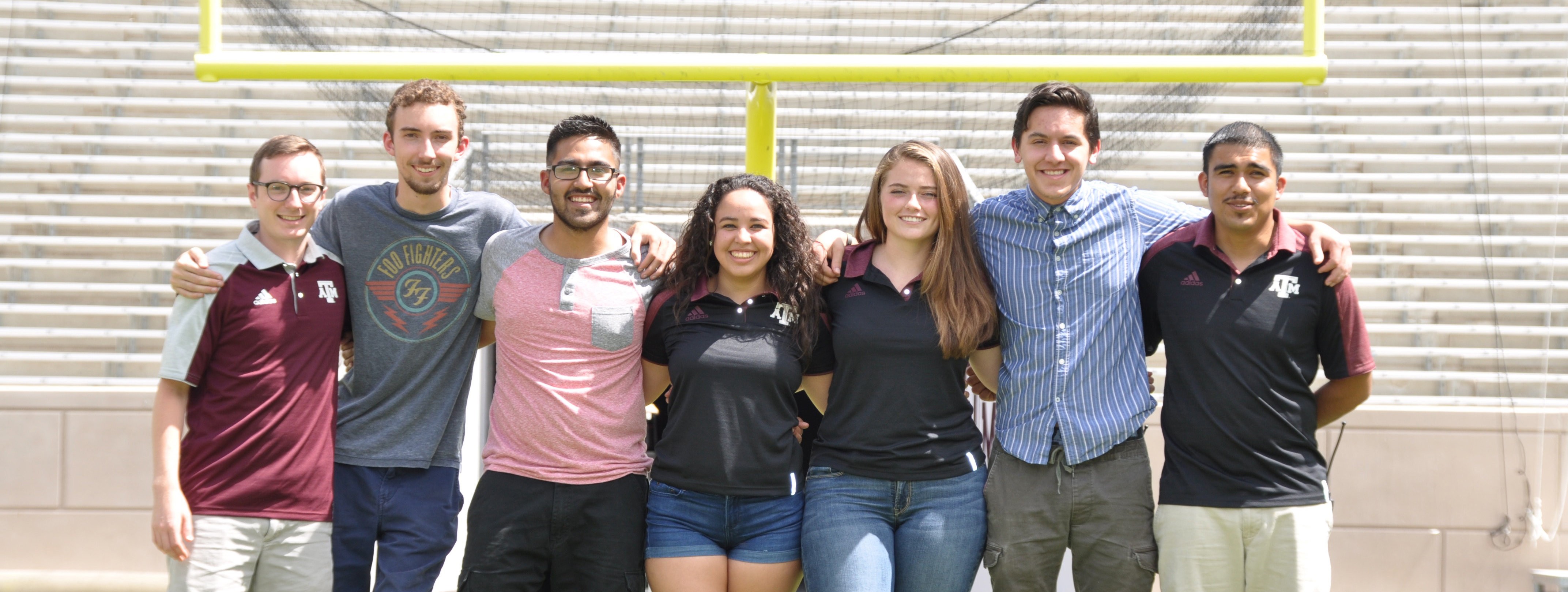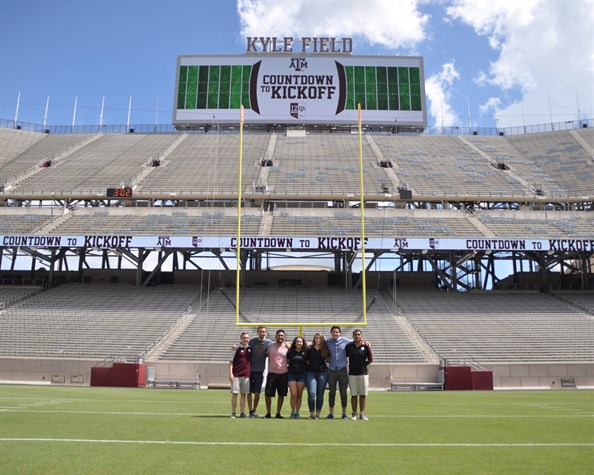
From left, engineering students Brian Proksch, Steven Kronk, Juan Lozoya, Casandra Ramos, Brooke Rogers, Christopher Vega and Jason Belmares are pictured on Kyle Field.
It is Saturday in Aggieland and thousands of maroon-clad fans are filing into Texas A&M University’s Kyle Field, anxiously anticipating the football game that will soon unfold on the turf.
Beneath the bleachers are the unsung heroes — the technicians, videographers, on-air talent and engineers that make up 12th Man Productions. They are responsible for the video board shows, TV shows, highlight videos and other programming associated with Texas A&M Athletics.

When the Aggies joined the Southeastern Conference in 2012, the university made a commitment to establish a facility that would provide SEC Network programming for ESPN. Part of Kyle Field’s renovation included an $11.4 million production facility used by 12th Man Productions.
Andy Richardson, assistant athletic director for 12th Man Productions, knew with the expanded production capabilities would come a need for engineers.
“I generally tell people I can tell time, but I can’t build a clock,” he said.
Richardson turned to Jesse Janosky, a broadcast engineer, to recruit engineering students to assist with the nuts and bolts of making television magic.
The experience of a lifetime
Janosky is living his dream at 12th Man Productions. The Penn State University graduate spent years knocking on the doors of local news station vans, begging for a chance to work behind the scenes. His persistence paid off 13 years ago, and he enjoyed an exciting career in sports television.
Now, Janosky is thrilled to give young engineering students the same opportunities he had.
There are 12 engineering students who work part-time for 12th Man Productions, running cables and completing many technical aspects of television production for all sporting events at the university.
“A lot of these kids didn’t even know that engineering television was even a thing,” Janosky said.
One student, hired last year, has since graduated and is now working for NBC Sports.
“Some of the students might want to do this for a living, and some might want to do it just because it’s a cool thing,” Janosky said. “Neither is right or wrong. We just want them to work for us and have fun.”
Learning how to learn
For engineering students, learning how to be a team player and solve problems is crucial. Chemical engineering student Brooke Roger said that’s exactly what she has learned in her two years as a part-time employee for 12th Man Productions.
“There’s no chemistry involved in this, but this is the best opportunity to learn how to be an engineer because of situations where you just have nothing to go off of, but there’s a problem and you have to figure it out,” Roger said. “We’re learning how to learn.”
Brian Proksch, an electronic systems engineering technology student said his job at 12th Man Productions could potentially alter his career aspirations.
“It’s something I hadn’t even thought of doing before I came here to work,” Proksch said. “I love getting to learn this stuff in a real world setting, and I’m thinking of doing some broadcast work next summer.”
The engineers arrive hours before kickoff to set up and troubleshoot. When the game begins, they’re on standby in case anything goes wrong.
“It really prepares you for a real world situation, said Juan Lozoya, an electrical engineering student. “If there’s a live event and something goes wrong, we have to fix it. We are able to think fast and be able to handle these situations.”
Jason Belmares, an electronic systems engineering technology student, said his work for 12th Man Productions has benefitted him in the classroom.
“In my major we do a lot of soldering and hands-on work wiring cables,” Belmares said. “I definitely do that with this job, so now when I go to class, I know what I’m doing.”
While biomedical engineering student Christopher Vega isn’t soldering or running cables in his classes, he said the experience still translates.
“Here, you’re put on the spot,” Vega said. “You can diagnose and figure out a problem and carry on those problem-solving skills into the field that I’m actually going into.”
In the end, gaining worthwhile experience is what it’s all about.
“They can walk out of here and put on their resumé that they helped us with ESPN productions,” Richardson said. “We think it’s a great relationship we’ve established with the college of engineering that allows these students that have a real interest in the hands-on application of all of this to come over here and be involved. We look forward to continuing to foster that relationship and have a steady stream of engineering students that are gaining that opportunity.”